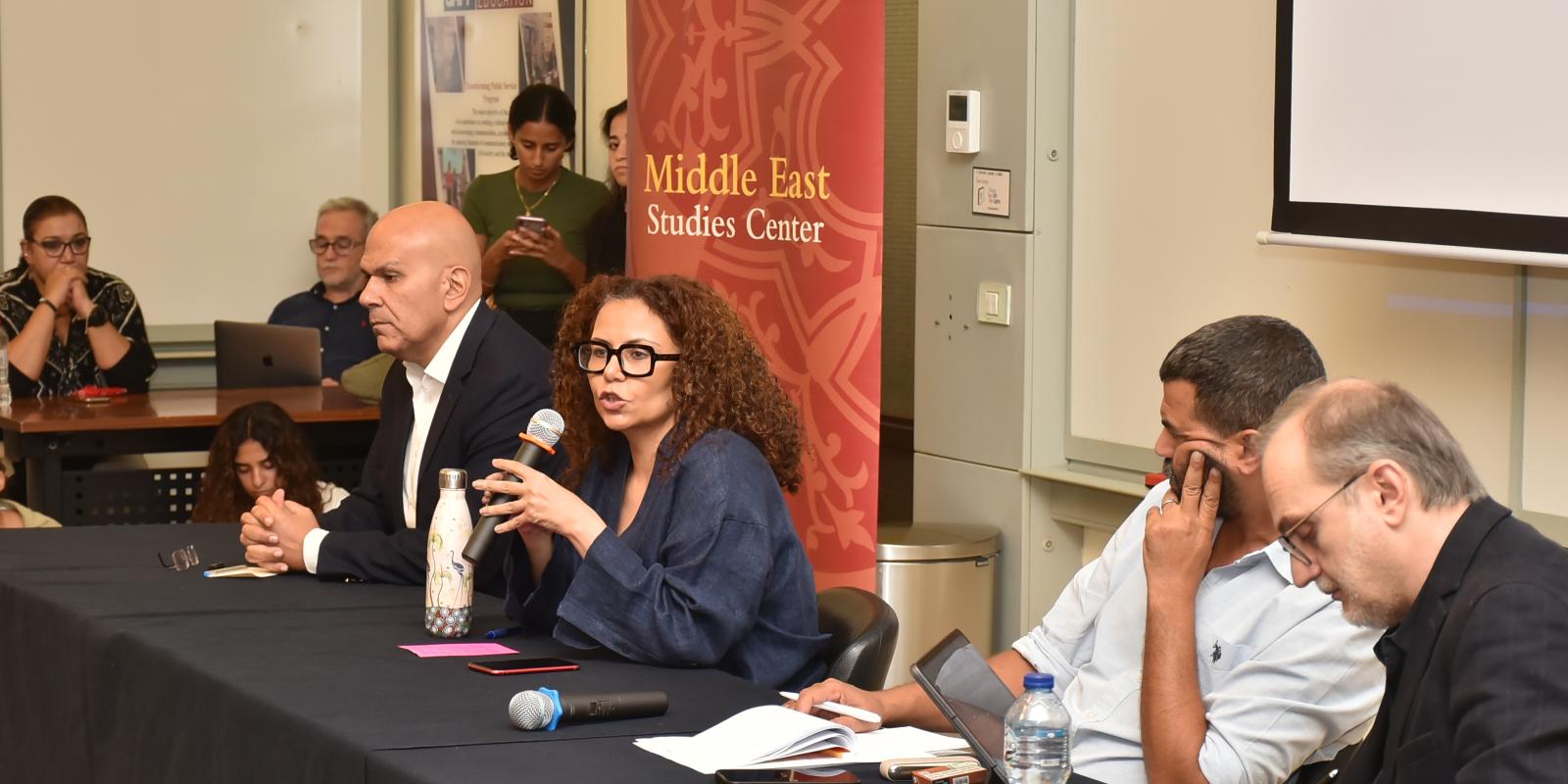
Faculty on Gaza: Tough Questions About the Future
One year into the war on Gaza, an AUC faculty panel addressed the humanitarian crisis and the future of Gaza. Moderated by Khaled Ezzelarab, associate professor of practice in the Department of Journalism and Mass Communication, the event featured Rabab El Mahdi, associate professor in the Department of Political Science, Karim Haggag, professor of practice in the Department of Public Policy and Administration, and Hani Sayed, associate professor in the Department of Law.
Ezzelarab began the discussion with a stark comparison: “In proportion to the population of Gaza, the death toll is equivalent to 2,000 September 11 attacks. The main headline of what happened last year must be the unprecedented destruction of life and property,” said Ezzelarab.
Shifting Dynamics
Since October 7, 2023, many aspects of the conflict have transformed. Haggag walked us through “the revival of existential narratives on both sides,” from the memory of the Holocaust on the Israeli side to the Nakba on the Palestinian side.
He also pointed out the agenda for “deciding the conflict in favor of Israel.” Part of that agenda, Haggag said, is a demonstrated intent to weaken and ultimately destroy the Palestinian National Authority, “the only address for Palestinian national aspirations … within the territory.” This comes alongside an “explicit annexationist agenda” and a very clear plan to forcibly displace Palestinians from the territories.
Simultaneously, Haggag shared, there is a trend by which Arab Israelis are identifying more and more with the Palestinian struggle itself. So, “in essence, we may not be talking about a Palestinian-Israeli national conflict” but “an Arab-Jewish ethno-religious conflict” among Israelis moving forward.
“In proportion to the population of Gaza, the death toll is equivalent to 2,000 September 11 attacks. The main headline of what happened last year must be the unprecedented destruction of life and property.”
Sayed added that the Palestinian question is an issue of global justice. He criticized the tendency toward “legal fetishism,” or the pattern by which political discourse collapses “into an exchange of legal claims for justification and condemnation,” with a tendency to believe that arguments about freedom have the power to decide political questions.
Within the nature of the Israeli system of control over Palestine since 1948, “A peace process that accepts, legitimizes and embodies ethno-national political goals will necessarily fail,” said Sayed. The systemic control exercised by Israel over Palestine, he argues, is essential for any meaningful political process to address. This ethno-nationalist project inherently involves controlling populations, territories and resources, ultimately leading to recurring cycles of violence.
Additionally, while the Global North is slowly recognizing the Palestinian struggle, Sayed said, “Palestine was never misunderstood in the Global South” as part of the shared anti-colonial narrative. He stressed the importance of viewing the humanitarian crisis in Gaza as a moral failure that speaks to patterns of normalized destruction of Palestinian lives. “What happens in Gaza is the template for how Israel aims to contain, subjugate and exclude the Palestinian population everywhere.”
Anti-Colonial Movements in a Historical Context
El Mahdi emphasized the historical role of armed resistance in anti-colonial movements. She argued that the right to armed struggle against an occupation is embedded in international law and that the context of popular resistance in Palestine is often ignored. “Armed resistance is a right that has been recognized … repeatedly through resolutions of the UN General Assembly,” said El Mahdi. “This is not to glorify violence, but I do not know of a liberation movement against settlement occupation that succeeded without some form of armed resistance.”
“A peace process that accepts, legitimizes and embodies ethno-national political goals will necessarily fail.”
El Mahdi noted that Nelson Mandela’s party, the African National Congress, had an armed resistance faction while liberating subjects of apartheid in South Africa and is now the governing party. Even Gandhi, known for nonviolently liberating India from British rule, “did not exist in a vacuum.”
Paths Toward Peace
As comments from the audience addressed the future of Palestinian resistance and the regionalization of the Palestinian cause, Haggag questioned whether new strategies are needed to create change in the face of the current struggle. “Can we still talk about a two-state solution? Can we or do we need to shift focus?” He suggested a potential need to transition toward a struggle of civil rights within what is a one-state reality now emerging in the entire territory between the Mediterranean Sea and the Jordan River.
As the situation in Gaza worsens, the panelists called for both solidarity and critical reflection on the future of the Palestinian cause.
